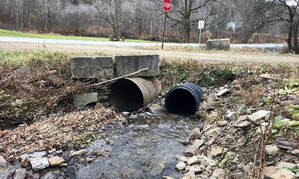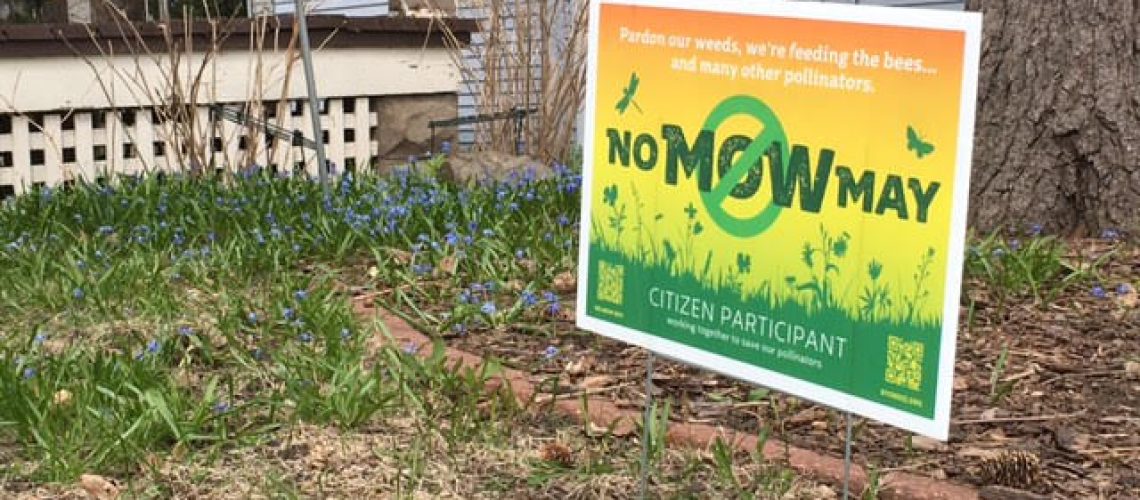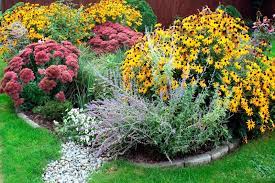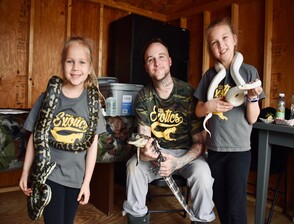CONSERVATION CORNER
A weekly blog for all things conservation
|
By: Joe Quatrini; Technical Team Leader; BCCD Have you ever seen something that was different than what you’re used to and thought “Hmm, that’s different it must be BAD!” Maybe you’re not even sure what you’re looking at but you decide you should hate it, just because it’s a change or you don’t understand it. Unfortunately, it’s almost what our brains are trained to do these days, especially in today’s society. We see something and judge it before we even try to figure out what it is. We often see this when it comes to projects we’re part of.  Inlet: Example of a poorly constructed stream crossing: multiple pipes and much too narrow for the stream width. Inlet: Example of a poorly constructed stream crossing: multiple pipes and much too narrow for the stream width. Take for example one initiative we are working on to help our municipalities and private landowners reduce flooding and prevent costly damage when storms hit. This initiative has to do with making stream crossings bigger. “What’s a stream crossing?” you ask. Great question and thanks for asking! A stream crossing is where a road (or a driveway) and a stream (creek, brook, run, river, etc.) intersect or cross one another. If you drive on a road and look out the window and see a stream coming right at the road and you don’t get wet, that probably means that stream is flowing through some type of pipe or bridge under the road. Obvious, right?
0 Comments
 By: Tim Robson; DGLVR Specialist. In this week’s column we are bring you the second of what will be 4 articles this year, all of which will focus on the different seasons of Municipal maintenance. We will explain what you may see going on in your township and why. After all, in know many of us have wondered why are the doing what they are doing? This of course is a general overview and may very depending on municipality. Everyone does things a little different. I will simply explain the process from my view as a former Road Forman and current Dirt and Gravel Road Specialist here at the Bradford County Conservation District. For this first article we will focus on the upcoming spring maintenance season.  From Kevin Brown, BCCD -this is a reprint from an web article I saw the other day. It hit home after I was mowing lawn the other day and was concerned of the number of honeybees that would not leave their flowers, even if I slowed way down, and went through the mower. Bees are already in huge decline without us killing even more this way. What is the answer? Authors: Alex Schultz, Co-Chair of Pollenablers–Fox Cities, Bee City USA Appleton Israel Del Toro, President of Appleton Pollinator Project, Bee Campus USA Lawrence University The Appleton Bee City USA affiliate group, Pollenablers-Fox Cities, and the Bee Campus USA affiliate group, Appleton Pollinator Project, teamed up in 2020 to launch the United States’ first No Mow May initiative, an import from Great Britain’s Plantlife organization. The basic tenet of the program being the voluntary delay of early lawn mowing for the month of May increases spring pollinator habitat and foraging opportunities as early flowering grasses and sedges are allowed time to blossom and provide an essential boost of energy for pollinating insects.  Kevin Brown, BCCD, Ag Team Leader I will call it this for lack of a better term right now. The Conservation District will hold a meeting this Saturday, the 14th, to talk about a number of outdoor, around-the-house topics. We get a lot of interest in our No-Till Garden information when we present it. This will be the first topic on the agenda. I will confess that I am no gardener. In fact, I used to hate gardening. However, I have found a new way- Mulch, Plant, Harvest, Repeat. Even I can do that little. I don’t have to till, and even better, I don’t have to weed or water it. I can enjoy my summer instead of chasing the garden chores the whole time.  By: Cathy Yeakel, BCCD District Manager What did you do on Earth Day? Earth Day was first celebrated on April 22, 1970, as an environmental awareness day to educate people about pollution and its effects on the environment. Founded by a U.S. Senator from Wisconsin, Gaylord Nelson, Earth Day became a global movement to protect our environment. Since 1970, celebrations have changed from awareness lectures to outdoor events offering education on our natural resource issues and demonstrations. |
AuthorsVarious staff at the Bradford County Conservation District Archives
July 2024
Categories
All
|
|
Bradford County Conservation District
Stoll Natural Resource Center 200 Lake Road, Suite E | Towanda PA 18848 Phone: (570)-485-3144 |
